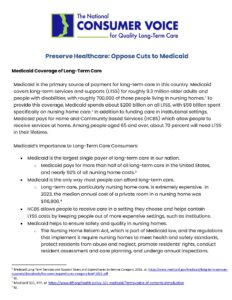To provide this coverage, Medicaid spends about $200 billion on all LTSS, with $59 billion spent specifically on nursing home care. In addition to funding care in institutional settings, Medicaid pays for Home and Community Based Services (HCBS) which allow people to receive services at home. Among people aged 65 and over, about 70% will need LTSS in their lifetime.
Medicaid
Overview
Medicaid is the primary source of payment for long-term care in this country. Medicaid covers long-term services and supports (LTSS) for roughly 9.3 million older adults and people with disabilities, with roughly 700,000 of those people living in nursing homes.
Medicaid's Importance to Long-Term Care Consumers
Medicaid pays for long-term care for roughly 9.3 million older adults and people with disabilities.
Medicaid is the largest single payer of long-term care in our nation.
Medicaid pays for more than half of all long-term care in the United States, and nearly 50% of all nursing home costs.
Medicaid is the only way most people can afford long-term care.
Long-term care, particularly nursing home care, is extremely expensive. In 2023, the median annual cost of a private room in a nursing home was $116,800.
HCBS allows people to receive care in a setting they choose.
In addition to funding care in institutional settings, Medicaid pays for Home and Community Based Services (HCBS). HCBS helps contain long-term services and supports (LTSS) costs by keeping people out of more expensive settings, such as institutions.
Medicaid helps to ensure safety and quality in nursing homes.
The Nursing Home Reform Act, which is part of Medicaid law, and the regulations that implement it require nursing homes to meet health and safety standards, protect residents from abuse and neglect, promote residents’ rights, conduct resident assessment and care planning, and undergo annual inspections.
How will Medicaid cuts affect nursing home residents?
Cindy, a nursing home resident in Texas, describes what will happen in her life if Medicaid is cut.
Preserve Healthcare: Oppose Cuts to Medicaid
Cutting Medicaid would likely result in millions of Americans being unable to afford nursing home care and other long-term services and supports and put at risk the federal standards requiring quality of care and protection from abuse and neglect for each nursing home resident.
Reconciliation and the Possibility of $800 Billion in Cuts to Medicaid, Including Long-Term Care Supports and Services
Listen to an episode of the Pursuing Quality Long-Term Care podcast discussing what Medicaid cuts would mean for long-term care recipients, including nursing home residents and other consumers of long-term care supports and services. Additionally, this episode includes a call to action and lays out what you can do to help stop these catastrophic cuts to this essential healthcare program.
Share How Cuts to Medicaid Would Affect You
We want to hear from YOU
Tell us how cuts to Medicaid would affect you or your loved one receiving long-term services and supports. By sharing your story, you help inform our advocacy.




